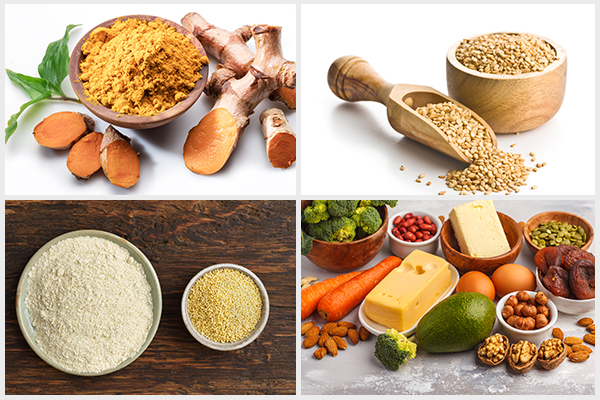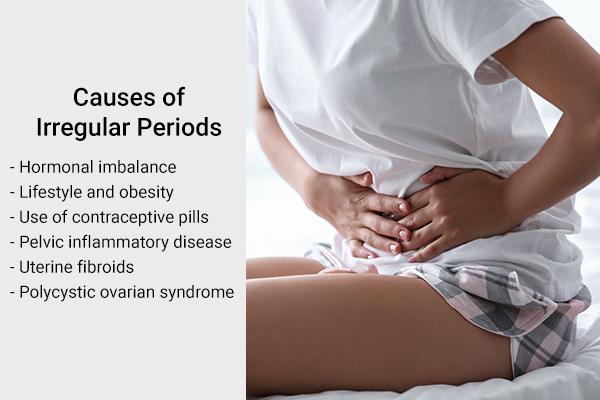In this article:
Menstrual bleeding or period is a biological process of shedding the uterine wall by bleeding through the vagina at regular intervals. The menstrual cycle as it is known is needed to keep the woman’s body healthy and prepare it for pregnancy.

A cycle is the duration between the first day of one period to the first day of the next period. The menstrual cycle normally repeats itself every 28–35 days. Thus, you can say that the average menstrual cycle is between 28–35 days long. The period usually lasts 4–6 days.
Usually, periods start in the female child at the age of puberty (12–15 years old) and last till the woman is 45–50 years old.
The regularity of the menstrual cycle may be an indicator of the woman’s health. (1) Irregular menstrual cycles have been associated with an increased risk of noncommunicable diseases such as ovarian cancer, hypertension, cardiovascular disorders, type 2 diabetes, mental health issues, and chronic inflammation leading to premature death (death before the age of 70). (2)
What Is Meant by Irregular Periods?
A menstrual cycle that is below 21 days or beyond 40 days or bleeding that lasts for more than 10 days is called an abnormal or irregular period.
So, how to check if you have irregular periods? First, check the frequency of your cycle, and then check the duration. Check for abnormal bleeding for a longer duration than the usual 4–6 days, and then check for bleeding outside the period time.
Also, are you experiencing a lot more pain than usual? Any deviations from the normal in any of these could be signs of irregular or abnormal periods.
Home Remedies to Improve Irregular Periods
Though allopathic treatments are available for the treatment of irregular periods and heavy bleeding during periods, these have many side effects. Hence, it is better to explore alternatives.
Here are some home remedies that can help treat irregular periods.
1. Consume ginger
Ginger has many health benefits, and one of the benefits is that it regulates the menstrual cycle. Ginger contains gingerol, which aids in uterine contraction and balances the hormones, thereby regulating the menstrual cycle.
A recent study reported that intake of ginger reduced heavy menstrual bleeding. (3)
How to use:
Ginger can be taken as a boiled concoction with honey and lemon or as a tincture. (4)
2. Try cinnamon
Cinnamon is an herb with a very strong odor. It improves the blood flow to the uterus and reduces abdominal pain and nausea, thereby helping in treating irregular periods.
How to use:
Cinnamon may be taken as an herbal tea concoction or maybe added to a glass of milk and ingested. (4)
3. Sip fennel tea
Fennel has estrogenic activity, which helps to balance hormones and regularize periods. (5)
How to use:
Fennel tea can be taken twice daily to regularize periods. Boil fennel seeds in water, strain the tea, and add honey to taste.

4. Drink raspberry tea
Raspberry leaves help in relaxing the smooth muscle of the uterus and thus can be helpful if there is pain associated with irregular periods.
How to use:
Add the leaves of red raspberry to boiling water to obtain a strong tea. Add this to the juice of an orange. Take 3 cups of this mixture as a treatment for menstrual pain. (4)
5. Drink turmeric milk
Turmeric is an herb that has many health benefits. It is anti-inflammatory, antimicrobial, and antispasmodic and is used in the treatment of many health ailments such as colds, cough, and fever. It also helps in reducing uterine cramps.
How to use:
Mix some turmeric powder with hot milk and add honey to the mixture. Drink this turmeric milk to get your periods on time. (6)
6. Consume sesame seed tea in moderation
Sesame is reported to have estrogenic activity and hence can be used to regularize the menstrual cycle by inducing bleeding in patients with infrequent periods (oligomenorrhea). (7)
How to use:
Boil some sesame seeds and jaggery in water to obtain a strong tea. Strain the tea, and drink it regularly for about 10–15 days a month to regularize your period. More consumption is not recommended since it can generate a lot of heat in the body.

7. Improve your food habits
Adequate nutrition is an important aspect of treating disorders related to the menstrual cycle. A diet low in foods causing an inflammatory response in the body should be avoided. Likewise, avoid foods with a high glycemic index.
Here are some food recommendations: (4)
- Avoid refined carbohydrates, sugary foods, and dairy products.
- Limit consumption of red meat and egg yolk to two times a week.
- Increase consumption of whole grains such as millet, brown rice, and oats.
8. Take nutritional supplements
Some vitamins and other food supplements improve organ functioning in the body and thereby provide relief from irregular menstruation.
- Vitamin A: Ensures a healthy uterus by promoting healthy endometrial growth.
- Omega-6 fatty acids: Borage and primrose oil, which contain high levels of omega-6 fatty acids, tone up the uterus.
- Cod liver oil: In addition to being a good source of vitamins A and D, cod liver oil provides the necessary molecules for hormone synthesis and thus helps regulate hormonal balance. (4)
9. Use aromatherapy

Oil massage blends using lavender oil, sage oil, and German chamomile oil reduce the pain and cramps during the menstrual cycle. (4)
10. Yoga and exercise can help

Regular exercise helps in maintaining a healthy weight and balances the hormones in the body, thus normalizing the menstrual cycle.
Yoga is a holistic remedy and has been shown to be beneficial in balancing the mind and the body, resulting in healthier individuals. Specific yogic postures that are useful in addressing menstrual problems are dhanurasana (bow pose), utrasana (camel pose), matsyasana (fish pose), and malasana (garland pose).
According to research studies, yoga therapy positively impacts the menstrual cycle by reducing stress and anxiety. (8)
Causes of Irregular Periods
Irregular periods may be the result of any of the following conditions. (4)

- Hormonal imbalance: The menstrual cycle is triggered by the hormones acting on the wall of the uterus. Any changes in the secretion pattern of these hormones could lead to irregular periods. Especially disruptions in thyroid function could lead to irregular periods. (9)
- Lifestyle and obesity: A sedentary lifestyle and unhealthy food habits such as gorging on fast foods could lead to irregular periods. Previous studies have reported obesity, stress, and smoking are also the factors behind irregular periods. (10)
- Use of contraceptive pills: The use of the contraceptive pill disrupts the normal hormonal balance of the body leading to painful and abnormal periods. (11)
- Pelvic inflammatory disease: This is an infection of the female reproductive organs that damages the uterus, leading to irregular periods. (12)
- Uterine fibroids: These are noncancerous tumors that grow in the muscular wall of the uterus. They range in size from very small to very large, and sometimes more than one fibroid may be present in the uterus. Often, fibroids lead to heavy bleeding, cramps, and irregular periods. (13)
- Polycystic ovarian syndrome (PCOS): Irregular periods can also be due to PCOS, which occurs when there is a higher level of androgen hormone (male sex hormone) in females. Androgen is normally present in females but in very little amounts. When there is more secretion of androgen hormone, there can be changes in the menstrual pattern such as missed periods or no periods. (14)
Diagnosing Irregular Periods
The doctor may use the following diagnostic tools to identify the root cause of your irregular periods:
- Checking your vitals (heart rate, blood pressure), and weight
- Examining your heart, lungs, and pelvic area
- Pregnancy test
- Blood tests to determine certain hormone levels (testosterone, thyroid-stimulating hormone, prolactin, 17-hydroxyprogesterone, DHEA, follicle-stimulating hormone, cortisol)
- 24-hour urine collection to look for free cortisol
- Pelvic ultrasound
Lifestyle Modifications and Personal Care
Avoid stress, do not drink alcohol, and do not smoke. Adopt a healthy lifestyle and get at least 8 hours of sleep every day. These habits will help regulate your circadian rhythm and normalize your menstrual cycle.
When to See a Doctor
Irregular menstrual periods are completely normal in three cases:
- After the first period or menarche
- The initial few periods following a miscarriage, abortion, or childbirth
- Before menopause
In all these cases, the reason behind the irregularity is the absence of ovulation.
Barring these exceptions, any abnormalities in your usual menstrual pattern such as delayed periods (by a week or more), missed periods, heavy menstrual flow, and bleeding between periods including light “spotting” warrant medical evaluation.
What your doctor may ask you:
- Are you experiencing a lot of stress lately?
- How much do you exercise?
- Did you ever struggle with an eating disorder?
- Did you lose weight recently?
- Did you put on weight recently?
- Do you find it difficult to tolerate extreme temperatures (hot or cold)?
- Have you been experiencing skin dryness, racing heartbeat, hair loss, constipation, diarrhea, or weight fluctuations? All of these indicate thyroid dysfunction, which can cause menstrual irregularities.
- Do you have abnormal hair growth on your body?
- Are your menstrual cycles regular?
- Do you always get heavy or prolonged menstrual flow?
- At what age did you start menstruating?
- How long have your periods been irregular?
- When you do have your period?
- Are your periods accompanied by symptoms such as abdominal cramps, mood swings, and bloating?
- Are you sexually active?
- When did you have your last menstrual period?
- How many times have you conceived?
- What was the outcome of each pregnancy (live births, miscarriages, cesarean sections)?
- Have you experienced any problems in conceiving?
Most-Asked Questions About Irregular Periods
Does acupressure work for irregular periods?

Pressure applied at specific points helps in increasing the flow of life energy (qi) through specific channels in the body.
Stimulating specific points in the abdomen, such as where the leg joins the trunk and two finger widths below the belly button, by applying pressure eases menstrual discomfort. (4)
Another acupressure point is the union valley point, located in the fleshy joint between the thumb and index finger of both hands. Stimulating this point by applying pressure on the fleshy region helps in normalizing delayed, irregular periods.
What is mudra therapy and can it help improve irregular periods?
Mudras are specific hand poses that make use of the fingers. You can use your fingers to help treat irregular periods.
Caution: Learn mudras and yoga asanas from a scientifically trained expert. You will surely find that it is time well spent.
Final Word
Menstrual problems afflict many women the world over and can lead to various complications and metabolic disorders in the long run.
Besides having undesirable side effects, allopathic medicines are ineffective in treating the disease. Hence, medicinal plants are the best alternative for the treatment of menstrual problems. Many plants have been found to be very effective in managing the problem.
These treatment options along with lifestyle changes and regular exercise could be a long-term solution to the problem.
- Was this article helpful?
- YES, THANKS!NOT REALLY


